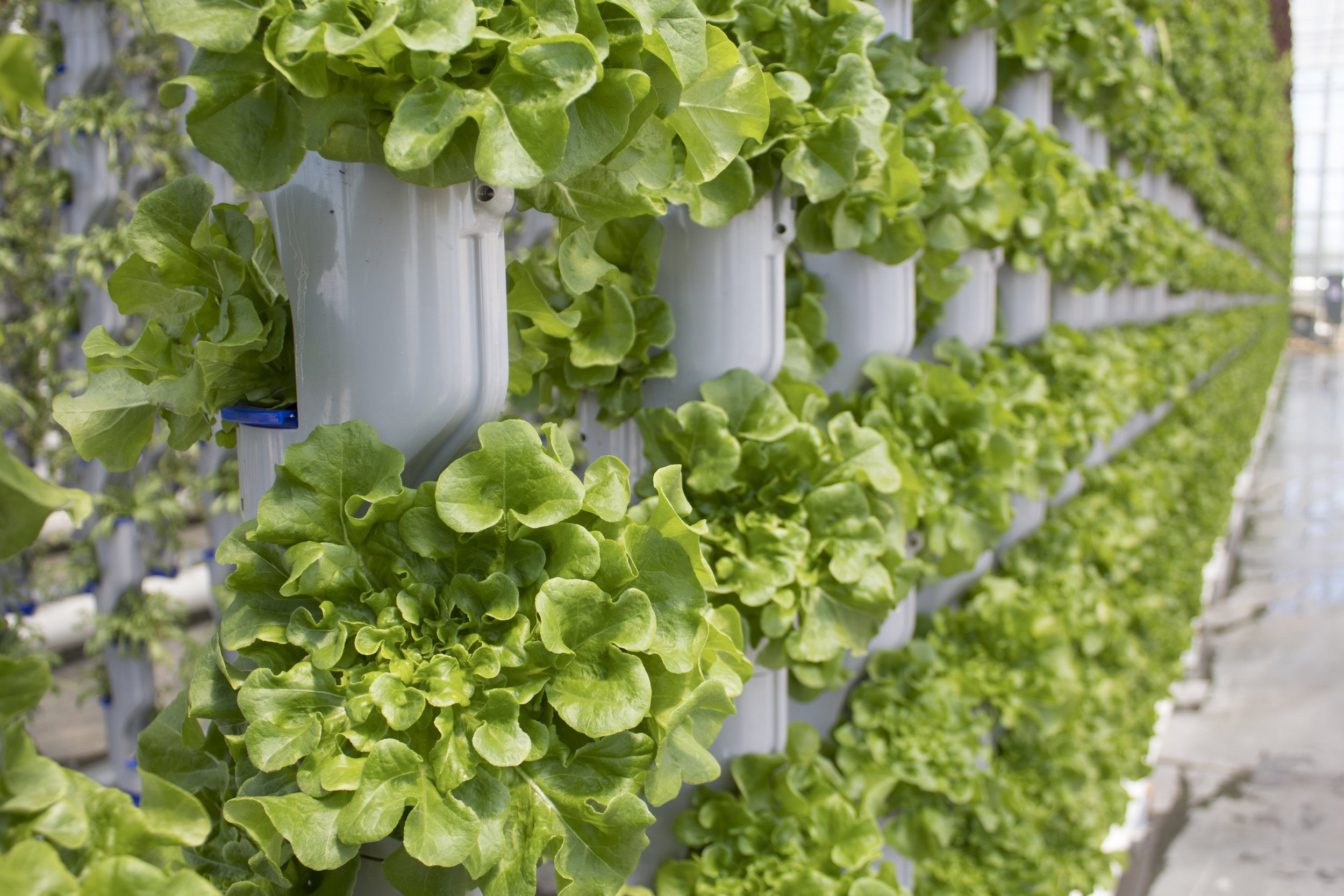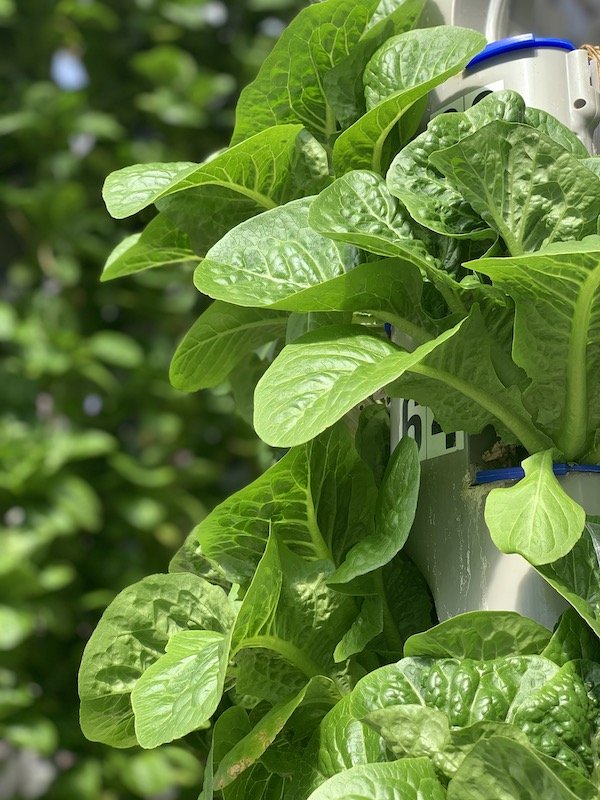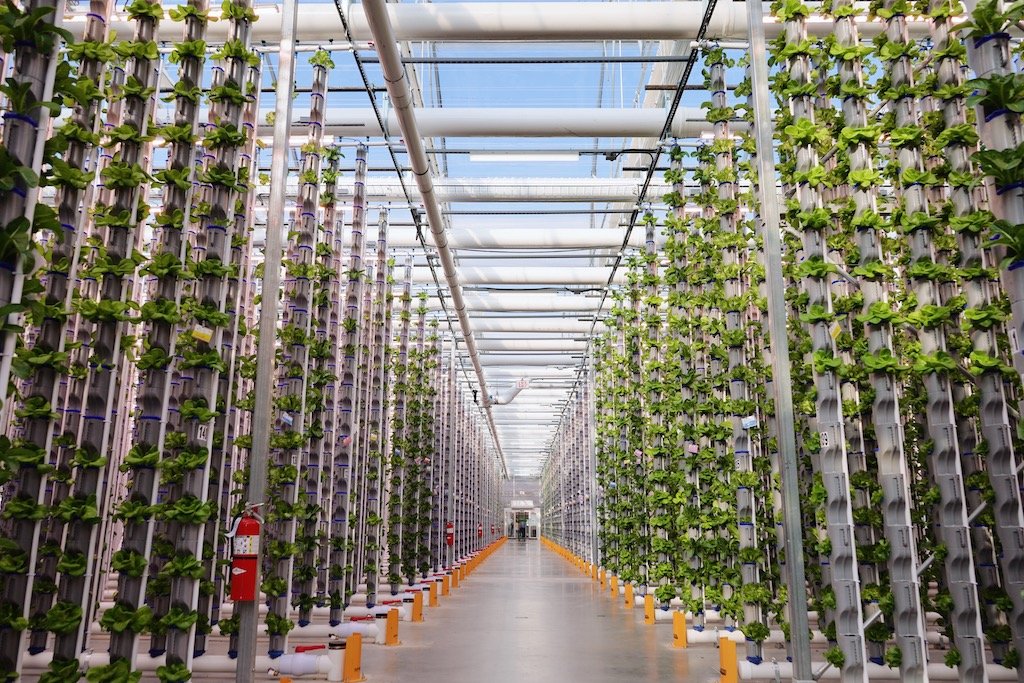What Is Vertical Farming? Everything You Should Know About This Innovation
Discover what vertical farming is, how it works, and major problems it can solve for current and future generations.
It’s no secret that the future of agriculture is concerning and needs a change. Overall, the population is growing at about 1 percent per year, even faster in some countries. Feeding this growing population is sure to be a challenge as time progresses.
Adding to the problem, current and former agricultural practices are incredibly harmful to the planet. Agriculture has been implicated as a driving cause of climate change, deforestation, and soil degradation. The problem is so significant that we’ve lost a third of our arable land over the past 40 years.
We must find better ways of producing food for future generations. Fortunately, new farming technology, such as vertical agriculture, offers an excellent way to meet these challenges and produce the food needed for future generations.
What is Vertical Farming?
Vertical farming is exactly what it sounds like: farming on vertical surfaces rather than traditional, horizontal agriculture. By using vertically stacked layers, farmers can produce much more food on the same amount of land (or even less).
Often these layers are integrated into buildings such as skyscrapers, housed in warehouses or shipping containers, greenhouses (like ours), or placed in spaces that would otherwise be unfit for farming.
Yet vertical farming is much more than just stacking plants and hoping for the best. The practice requires artificial temperature, light, water, and humidity control. If a delicate balance is not maintained, it’s possible to lose an entire crop the way a traditional farm might in the event of a drought or flood.
The History of Vertical Farming
It’s easy to think of vertical farming as a new concept, especially considering the high-tech vertical farming companies emerging today. But the ideas behind the practice go back millennia. The first example of vertical farming known today is that of the Babylonian Hanging Gardens around 2,500 years ago.
Even hydroponic farming is not entirely new. Around a thousand years ago, the Aztecs developed a version of this practice, called chinampas, by growing their plants on rafts floating above rivers and lakes.
A more technologically advanced form of vertical farming popped up in the 1600s. French and Dutch farmers developed ways to grow warmer-climate fruits against stone walls that retained heat, creating their own microclimates.
How Does Vertical Farming Work?
Vertical farming may answer many of agriculture’s challenges, such as providing us with more food on less land and doing so sustainably. But how do vertical farms work, exactly?
Several vertical agriculture models are available, from patio gardens built into old pallets to warehouses with stacked trays and greenhouses (like ours) that produce food for entire communities. Here are the details on how Eden Green Technology’s hydroponic greenhouses work.
Our hydroponic vertical farming technology allows growers to cultivate crops in stacked plant spots within tower-like structures. These patented towers are hydroponic systems designed to produce the perfect micro-climate and enable farmers to grow their crops year-round.
Our vertical hydroponics are designed to provide crops with access to natural sunlight so they grow with less land, water, and energy waste. Our state-of-the-art sustainable system allows you to control all aspects of your farm. This includes production tools that will help you optimize crop cycles and produce plenty of yields to meet your needs.
How Does the Seed Life Cycle Work in a Vertical Greenhouse?
First, seedlings are planted in hydroponic media for growth in nutrient-enriched water with no soil necessary, like peat moss, coco coir, or rockwool.
Once they have matured, the seedlings are transferred into our hydroponic towers, which allow dozens of plants to thrive in minimal floor space.
There, the plants' roots develop, allowing them to absorb and maximize our nutrient-rich water solution.
Everything is temperature-controlled and given appropriate sunlight, creating a microclimate that can be adjusted as needed for healthy, thriving plants.
What Can You Grow in Vertical Farms?
Eden Green’s hydroponic technology is constantly growing to include more and more options. Currently we offer systems for growing more than 50 types of plants, including leafy greens, peppers, and micro herbs. Here are a few of our more popular crops:
Spinach
Kale
Mint
Lavender
Basil
We also have several experimental crops that are currently in testing in our R&D facility and are coming soon to a hydroponic vertical greenhouse near you. These include:
Strawberries
Tomatoes
Celery
Cucumber
Many more
Eventually, we hope to offer a wide variety of plants, feeding cities around the world with local nutrient-dense produce that’s affordable and healthy. The hydroponics concept does have limitations, however. It cannot currently grow tubers such as potatoes, onions, and garlic.
The Benefits of Vertical Farming
Vertical farming has many benefits, with this model providing maximum output with minimal environmental impact and far less space required. With resources at a premium, it will become increasingly difficult to maintain food production using traditional methods.
Utilize Less Water & Space
With vertical farming techniques; farmers can use 98 percent less water and 99 percent less land. They can produce crop yields of 240 times that of traditional farms through year-round rolling or perpetual harvest. All of our produce is powered by the sun rather than LED lights, so these crops are not reliant on fossil fuels or other less ideal energy sources.
By 2050, around 80 percent of the world's population will live in urban areas. This population structure will mean a higher demand for food in the areas where land is the hardest to come by. In these large urban centers, vertical farming offers a way to meet this increased demand for food without the need for vast fields.
Increased Production All Year
Vertical farming also offers increased production overall and consistent year-round production. Gone are the days when some fruits and vegetables were only available seasonally. Instead, vertical farms can produce all sorts of crops year-round with little dependence on weather or climate.
Controlled Environment Agriculture (CEA) Eliminates Environmental Impacts
Indoor vertical farming often includes a practice called Controlled Environment Agriculture, or CEA. CEA involves a series of technologies designed around providing optimal conditions for plants. It controls factors like temperature, lighting, and humidity to allow farmers to grow plants that would otherwise not be suitable for the climate and weather.
There are several benefits to a CEA setup. CEA can significantly lessen the occupational hazards associated with traditional farming. Indoor farming does not allow access to wildlife, eliminating the conflict between farmers and native species. It doesn’t expose farmers to hazards and diseases such as malaria, poisonous chemicals, and other life-threatening challenges. And with no hazardous chemical runoff, farm-adjacent communities are also protected.
According to EcoWatch, vertical farms are the way of the future:
“Vertical farms are being used beyond food. In fact, they’re being used to aid human health. Caliber Biotherapeutics in Bryan, Texas, is home to the world’s largest plant-made pharmaceutical facility. This 18-story, 150,000-square-foot facility contains a staggering 2.2 million tobacco-like plants stacked 50 feet high, that will be used for making new drugs and vaccines. Because the indoor farm is so carefully monitored and tightly controlled by technicians, these expensive plants are shielded from possible diseases and contamination from the outside world.”
If you’re interested in this topic, we wrote an article on how vertical farming helps to prevent farming diseases.
Food Desert Solution
Finally, vertical farms can solve the increasing problem of food deserts in heavily populated areas that lack access to fresh foods such as fruits and vegetables.
Because vertical farms can be constructed with a small footprint and can even be integrated into existing buildings and rooftops, vertical farming has already started to produce food oases where deserts once existed.
This provides healthy food where only unhealthy options were previously available. Because it doesn’t require a lengthy shipping and warehousing process, it can also produce affordable and nutritional food for low-income families.
Reduced Arable Land
With arable land quickly depleting due to erosion and pollution, we’re heading toward a crisis. We must find ways to produce healthy food without needing acres and acres of quality topsoil. Vertical farming can help contribute to this solution by farming upward rather than outward.
Since many vertical farms are contained within greenhouses or other structures, they can be built nearly anywhere — in densely populated urban centers, on rooftops and inside warehouses, or even in depleted areas where traditionally farmed crops can no longer grow.
Pesticide-free
CEA vertical farms typically have little need or even use for pesticides. By controlling the environment around crops, these systems keep out pests naturally – no need for chemical pesticides that can cause other problems down the line.
Reduced Emissions
Since vertical farms can be constructed in urban areas; this reduces how far produce travels between farms and grocery stores, lowering their carbon footprint. This also means fewer food miles and fresher produce reaching your local grocer. When food is grown mere miles from where consumers will eat it, it stays fresher longer, creating less food waste and offering fresher, healthy food for local families.
Food Safety
Food recalls are a common occurrence. We’re always hearing about produce tainted by E.Coli or other pathogens.
Vertical farming virtually eliminates this problem by carefully monitoring and controlling the environment around plants, creating near laboratory conditions and preventing farming diseases. In such an environment, the introduction of contaminants is far less likely.
Can Vertical Farms Feed the World?
Vertical farming is an amazing option to solve many of agriculture’s problems today, but it’s not a complete solution. Some crops simply won’t grow well in such a configuration, and there will always be a need for other growing methods.
That said, vertical farms can help feed the world by allowing growers to produce healthy, fresh foods in areas with little food production. They can offer ways for farmers to produce crops without worries over the effects of climate change since CEA systems allow for any climate the plants might need. And they can grow more food in less space, allowing us to continue to feed the growing population.
Vertical Agriculture With Eden Green Technology
There are a great many reasons to adopt vertical farming techniques today. Possibly the most important reason is that without them, we may not be able to produce adequate food to feed the world’s growing population. Yet this new farming method may seem overwhelming to those who are not well versed in it.
Fortunately, Eden Green Technology takes the hassle out of vertical farming by building, running, and harvesting produce for grocers and store brands. You tell us what you want, how much you want, and we will grow it for you. While other vertical farms put their label on packaging, we specifically offer private label options so you can represent your brand.
The Future of Indoor Vertical Farming
You don’t have to look very far to find predictions about the future of agriculture. Many believe vertical farming could be a significant portion of the picture of future agriculture. As AgTech continues to develop, farms are becoming increasingly high-tech, allowing farmers to produce more, pollute less, and meet the challenges facing us as we move into the future.
Vertical farms will also likely become more technologically advanced. This may mean robotic monitoring and harvesting, AI-powered CEA systems, and much more. One thing seems sure; vertical farms will likely become a lot more common as we seek to meet the challenges before us.
Frequently Asked Questions About Vertical Farming
Is Vertical Farming Efficient?
Vertical farming uses less water and less space and increases production throughout the year rather than being tied to a specific season. An Eden Green Technology farm can produce daily harvests all year long, with less than 3% food waste and the option to grow more than 200 varieties of hydroponic produce in a single facility.
Is Vertical Farming Profitable?
Profitability is one of the greatest difficulties in some vertical farming models. When starting a vertical farm, it’s essential to ensure you have the right technology and partnership for a profitable venture. Energy used for grow lights is among the most concerning vertical farm expenses. Systems like Eden Green Technology seek to minimize these costs while producing plentiful crops for sale.
What Crops Can Be Grown in a Vertical Farm?
The best crops for vertical farming are typically leafy greens, herbs, and microgreens, but many others can work as well. Some vertical farms grow fruits, flowers, grains such as rice, and other vegetable varieties.
Does Vertical Farming Need Water?
Yes, vertical farms use water, but because they can recycle it through the system with minimal waste, they use far less than traditional farms. For instance, Eden Green Technology’s vertical farms use about 98% less water than traditional farming.
Does Vertical Farming Use a Lot of Electricity?
Some vertical farm setups use a great deal of electricity to power their grow lights. Eden Green Technology’s greenhouses attempt to use natural sunlight as much as possible, leading to 90% less light energy used than other vertical farming options.
What Soil Is Used in Vertical Farming?
Again, this depends entirely on the type of system you’re running. Some vertical farms still plant in soil, while others eliminate the dirt entirely. Hydroponic farms like those created by Eden Green Technology use water in place of soil.
Do Vertical Farms Need Fertilizer?
In a vertical hydroponic farm like the ones offered by Eden Green Technology, a nutrient solution added to the water replaces fertilizer and provides all the nutrients plants need to grow and thrive.
Can Vertical Farms Grow Rice?
Yes, some types of vertical farms can grow rice. There are growers in Singapore currently producing rice in vertical farms.
Do Vertical Farms Need Pesticides?
Vertical farms with CEA technology eliminate the need for chemical pesticides by keeping pests away from the plants in the first place. Careful monitoring and cleaning help growers spot problems before they become infestations, meaning no need to spray poisons onto food.
Do Vertical Farms Use Sunlight?
While not all vertical farms take this approach, Eden Green Technology’s vertical greenhouses attempt to make the most use of natural sunlight possible. We do this to cut down on the costs and pollution associated with powering large banks of grow lights. The result? We use 90% less light energy than other vertical farming options.
Which Country Uses Vertical Farming the Most?
While we’re not aware of any research showing exactly which country currently employs this technology most, several countries and cities worldwide have flourishing vertical farms and other urban agriculture projects.






